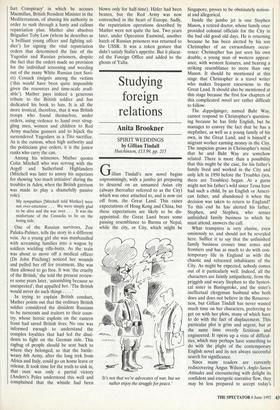The unexpected cruelty of the British
Denis Hills
AFTERMATH OF WAR: EVERYONE MUST GO HOME by Sir Carol Mather Brasseys, £22.50, pp. 278 Sit Carol Mather, who served on Mont- gomery's staff at three of the crucial battles of the second world war — at Alamein, the Normandy landings and the Ardennes re-examines in this book the notorious repatriation operations in Austria in 1945 which involved the Allies, Russians and Yugoslays and were marred by the use of duplicity and force. As Mather was not pre- sent at these operations he has had to rely on official documents, reports and war diaries, and on interviews with participants, to piece together his account. It is, he admits, 'perforce seen through British eyes'.
Mather sets the scene by describing the chaos in Carinthia when advance elements of the 8th Army reached Villach and Klagenfurt in early April 1945. The whole of humanity, he says, seemed to be on the move: prisoners-of-war, refugees and dis- placed persons, the Red Army — infiltrat- ing from Styria into the British zone at Graz, Tito's partisans looting in Trieste and bent on seizing the Italian province of Venezia Giulia, a bewildered Bulgarian division, anti-Tito Croats and Chetniks, Cossacks — many with families camping in covered carts like gypsies, Turkomans, Georgians and Ukrainians, and bands of liberated slave labour drunk and seeking revenge. The British army's immediate pri- ority was 'to clear the decks' and secure its communications and boundaries in order to deal with Tito's Moscow-backed partisans and Stalin's insistence on his pound of flesh. This meant, as Mather indicates in the subtitle of his book, a huge scavenging operation. Its repercussions are well known, for it entailed handing over, by trickery and force, some 26,000 Croats and other Yugoslays to Tito and 41,000 Cos- sacks, with their families, to the Red Army. Mather admits that the role played by British troops in these operations was unpleasant (some critics have called it dis- honourable). But forcible repatriation, he maintains, was the lesser evil if peace and order were to be restored.
Mather will have nothing to do with Nikolai Tolstoy's allegation of a `Klagen- furt Conspiracy' in which he accuses Macmillan, British Resident Minister in the Mediterranean, of abusing his authority in order to rush through a hasty and callous repatriation plan. Mather also absolves Brigadier Toby Low (whom he describes as 'a brilliant young officer and fighting sol- dier') for signing the vital repatriation orders that determined the fate of the Yugoslav and Russian prisoners, despite the fact that the orders made no provision for the individual screening and weeding out of the many White Russian (not Sovi- et) Cossack émigrés among the victims ('this would have been quite impossible given the resources and time-scale avail- able'). Mather pays indeed a generous tribute to the British soldier and has dedicated his book to him. It is all the more ironical, therefore, that it was British troops who found themselves, under orders, using violence to hand over strug- gling men, women and children to Red Army machine gunners and to hijack the surrendered Yugoslays as a Tito sacrifice. As is the custom, when high authority and the politicians give orders, it is the junior ranks who carry the can.
Among his witnesses, Mather quotes Colin Mitchell who was serving with the Argyll and Sutherland Highlanders (Mitchell was later to annoy his superiors for showing 'too much initiative' during the troubles in Aden, when the British garrison was made to play a shamefully passive role).
My sympathies [Mitchell told Mather] were not over-extensive . .. We were simply glad to be alive and the war over . . . It was the misfortune of the Cossacks to be on the losing side.
One of the Russian survivors, Zoe Paluka-Palmer, tells the story in a different vein. As a young girl she was manhandled with screaming families into a wagon by soldiers wielding rifle-butts. As the train was about to move off a medical officer (Dr John Pinching) noticed her wounds and pulled her off for treatment. She was then allowed to go free.. It was 'the cruelty of the British,' she told the present review- er some years later, 'astonishing because so unexpected', that appalled her. 'The British would never do such things .... '
In trying to explain British conduct, Mather points out that the ordinary British soldier considered the dissident Russians to be turncoats and traitors to their coun- try, whose heroic exploits on the eastern front had saved British lives. No one was informed enough to understand the complex loyalties that had led the dissi- dents to fight on the German side. This ragbag of people should be sent back to where they belonged, so that the battle- weary 8th Army, after the long trek from Africa and Italy, could go on home leave or release. It took time for the truth to sink in, that ours was only a partial victory (Anders's Poles understood this well and complained that the whistle had been blown only for half-time). Hitler had been beaten, but the Red Army was now entrenched in the heart of Europe. Sadly, the repatriation operations described by Mather were not quite the last. Two years later, under Operation Eastwind, another batch of Russian prisoners was returned to the USSR. It was a token gesture that didn't satisfy Stalin's appetite. But it placat- ed the Foreign Office and added to the ghosts of Yalta.



































































 Previous page
Previous page